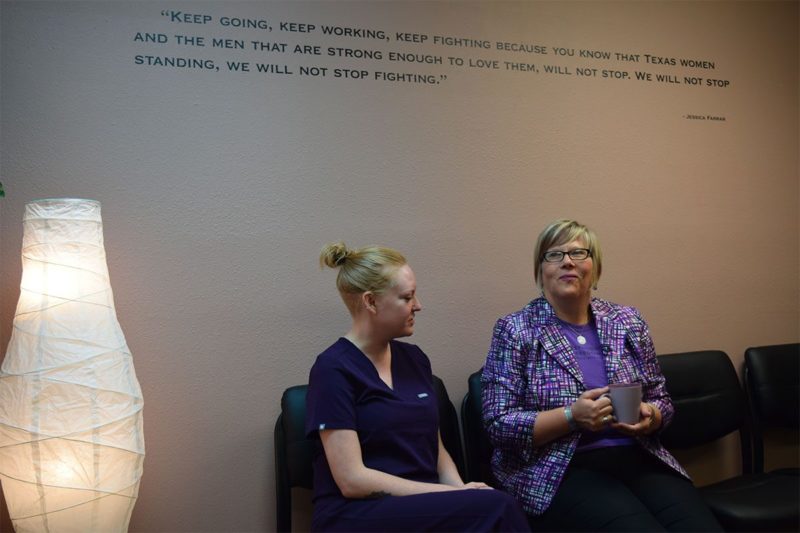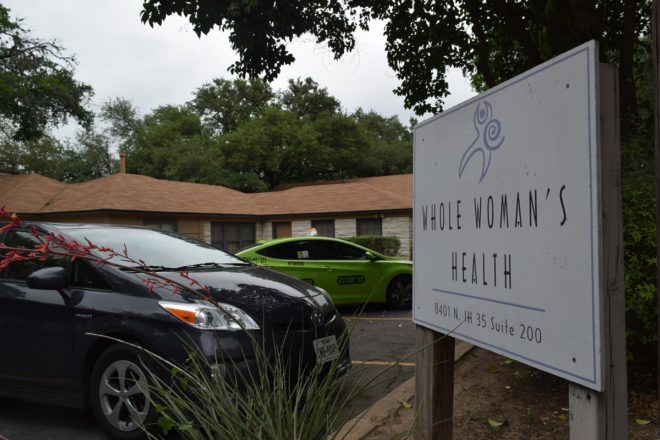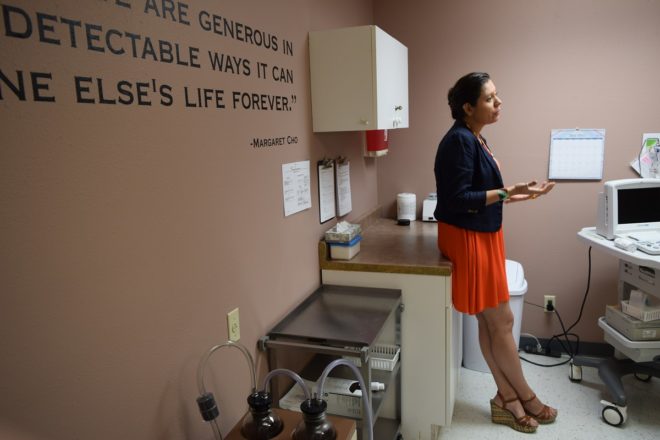Whole Woman’s Health Creates ‘Oasis of Care’ as Texas Abortion Clinics Reopen
With rooms named for pro-choice advocates and an abortion care provider murdered by an anti-abortion activist, Whole Women's Health officials stand defiantly against policies designed to destroy abortion access in Texas.

Texas’ GOP-dominated state legislature in 2013 passed the omnibus anti-choice bill known as HB 2, which would force more than half of the abortion clinics in the state to close over the next two years.
Whole Woman’s Health was forced to close three of the organization’s five Texas clinics in after passage of HB 2. The organization’s clinics in McAllen and Beaumont were closed in March 2014, and the flagship clinic in Austin was closed in August 2014.
Amy Hagstrom-Miller, CEO and founder of Whole Woman’s Health, became the public face of the legal battle by reproductive rights advocates to challenge the Texas anti-abortion law.
Hagstrom-Miller emerged victorious from U.S. Supreme Court building on June 26, 2016. In a 5 to 3 decision, the Court struck down two provisions of the Texas law, as the admitting privileges and surgical center requirements were ruled unconstitutional.
However, the law had already had Republican legislators’ planned devastating impact on abortion access, and clinics that were forced to close face steep challenges in reopening. Almost a year after the landmark Supreme Court ruling, abortion providers are beginning to reopen clinics and restore abortion services to some parts of Texas.

The Whole Woman’s Health clinic in Austin reopened on April 28, and is once again providing abortion care for pregnant people in central Texas.
Hagstrom-Miller explained during an open house last week for members of the media why she felt it was important to reopen the organization’s flagship clinic, the challenges to reopening the clinic, and her vision for how people should experience abortion care.
“When I first opened Whole Woman’s Health, I decided to position women’s health care—specifically abortion services—within the history of the women’s movement and wanted to invite an experience and create an oasis of care where people can come and learn about the women who came before them,” Hagstrom-Miller said.
Andrea Ferrigno, corporate vice president of Whole Woman’s Health and the leader of the Austin clinic reopening project, said there were significant challenges in reopening the clinic and that the organization was “essentially starting from scratch.”
Medical equipment had to be purchased, staff members had to be hired and trained, and the organization had to reapply for a license to operate an abortion facility with the Texas Department of State Health Services (DSHS).

Hagstrom-Miller walked through the facility with half a dozen reporters, describing how the clinic’s staff interact with patients and explaining what kind of services are provided, including medication abortion services and surgical abortion services for pregnant people up to 17 weeks and six days’ gestation. The clinic provides comprehensive reproductive health-care services like sexually transmitted infections testing and treatment, birth control counseling, and IUD consultation and insertion.
“Each of the rooms in the clinic are named after a different woman,” Hagstrom-Miller said. “Instead of exam room one or the lab or the ultrasound room, you might go to the Emma Goldman room or you might go to the Ann Richards waiting room or you might go to the Frida Kahlo room.”
There are two rooms named after men: Dr. George Tiller, the Kansas abortion provider who was murdered by an anti-abortion activist in 2009, and Dr. Dan Grossman, an investigator with the Texas Policy Evaluation Project whose research was instrumental in the Supreme Court’s decision striking down parts of HB 2.
Each of the clinic’s rooms has a quotation emblazoned on the wall attributed to the room’s namesake.
In a small room used for counseling patients, a floor lamp provides soft lighting, a bouquet of flowers sits on the table, and a pair of chairs provides a quiet place for discussions between staff and patients. A quote from Amelia Earhart is written on the room’s wall: “Courage is the price that Life exacts for granting peace.”
Ferrigno described the purpose behind the design of the clinic’s counseling rooms like the Amelia Earhart room.
“We have floor lamps and we usually keep the overhead lights off to create a more soothing environment and make it more relaxing and people really appreciate that,” Ferrigno said. “For the most part we try and create an atmosphere where it feels like an oasis of care. It feels more homey than cold, sterile, medical.”

The Austin clinic has a much different appearance than a typical abortion clinic or ambulatory surgical center. One of the provisions of HB 2 struck by the Supreme Court was the requirement that abortion care facilities meet standards adopted for ambulatory surgical centers, which would require clinics to make prohibitively expensive renovations.
“This is exactly the difference between an ambulatory surgical center and a small private women’s clinic like this,” Hagstrom-Miller said. “In an ambulatory surgical center you can’t have that low lighting, the hallway has to really wide, it just feels very hospital like, which is completely unnecessary for an in-office procedure that takes five or ten minutes.”
Hagstrom-Miller said requiring clinics to meet medically unnecessary regulations of ambulatory surgical centers was detrimental to the patient experience by reinforcing false narratives that one of the most common and safe medical procedures was “dangerous and scary.”
Abortion care is a medical procedure that many women will experience in their lifetime. Hagstrom-Miller views abortion as a “rite of passage.”
“One of the most powerful things about abortion is that women facing an unplanned pregnancy choose the course for their life, and take an active path of saying this is what I want I’m going to choose my future, I’m going to choose my dreams,” Hagstrom-Miller said.
“People really focus on the procedure, but abortion is just a thing,” Hagstrom-Miller said. “The byproduct of it is this autonomy and this aspirational moment where she’s choosing her future, and I think that’s the power piece of that abortion and about us having clinics open like this that reaffirm women’s autonomy.”

